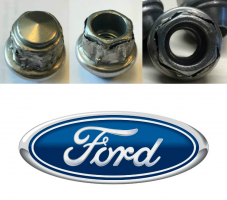
— A Ford swollen lug nuts lawsuit has been dismissed in its entirety because the judge ruled the plaintiffs "presented no legally viable claims" in the 120-count complaint.
According to the proposed class-action lawsuit, the lug nuts allegedly swell, deform and crack, making it nearly impossible to remove the lug nuts to change the tires. The alleged problem is blamed on vibrations from the road, temperature changes and moisture that deform the lug nuts.
The plaintiffs claim the Ford F-150, F-350, Escape, Flex, Focus and Fusion are all equipped with two-piece lug nuts that have steel cores with chrome, aluminum or stainless steel caps. However, the lawsuit alleges the automaker should have used one-piece solid steel lug nuts instead of the two-piece nuts with caps.
Although the lawsuit claims Ford uses the two-piece capped lug nuts to save money, attorneys for vehicle owners admitted in court the two-piece nuts are in reality more expensive to purchase than other lug nuts. That was an important point that wasn't missed by U.S District Court Judge Stephen J. Murphy, III in his decision to dismiss the case.
Based on court documents, the plaintiffs claim Ford owners must pay labor costs to get the swollen lug nuts removed, then must pay to replace the nuts that Ford allegedly should pay to replace. One of the plaintiffs says he paid nearly $60 to replace the lug nuts for just one wheel on his Ford Fusion.
In Ford's motion to dismiss the lawsuit, the automaker says the 120 counts contain "nonsensical" claims that don't prove the lug nuts are defective or a safety hazard.
The judge came down on the side of Ford, including for alleged violations of the laws of each of 50 states even though the plaintiffs make allegations for only 27 states.
According to the judge, the plaintiffs don't allege injuries in states other than their own or base their claims on other states' laws. This caused the judge to rule the plaintiffs lack standing to bring claims under the laws of the remaining 23 states.
The plaintiffs didn't fare any better with breach of warranty claims against the automaker because the judge ruled there were no facts to support the claims under the Magnuson-Moss Warranty Act or under state laws.
The plaintiffs claim Ford should have replaced and repaired the lug nuts under warranty, but the judge noted none of the plaintiffs presented their vehicles to Ford within the warranty periods.
Part of the requirement of the new vehicle limited warranty is that an owner present the vehicle to a Ford dealer during the 3-year/36,000-mile warranty period, but only one plaintiff claims he did anything within that period.
However, the plaintiff says he took the lug nuts to a dealer but never took his vehicle, an action not covered under the clear terms of the warranty.
The judge further ruled fraud and consumer protection claims fail because the plaintiffs didn't allege necessary facts to plead the claims. According to the dismissal order, the plaintiffs can't prove Ford knew about alleged lug nut defects before the vehicles were sold, and the plaintiffs "simply have not pleaded any representations related to lug nuts."
According to the judge, the plaintiffs claim Ford must have known about alleged lug nut problems because of negative reviews on third-party websites and complaints made to the National Highway Traffic Safety Administration (NHTSA). However, the judge ruled complaints made to NHTSA are not sufficient to allege Ford knew about swollen lug nuts.
According to the Court, the plaintiffs fail to provide facts that prove Ford was even aware of the complaints.
In addition, the judge referenced other legal cases where previous courts found complaints made to NHTSA and third-party websites don't rise above mere speculation that manufacturers had knowledge, "let alone exclusive knowledge," of alleged product failures.
The swollen lug nuts lawsuit also failed in asserting claims of unjust enrichment as the judge ruled there were no sufficient facts to establish Ford benefited from customers complaining about the lug nuts.
As mentioned earlier, attorneys claimed in the original lawsuit that Ford used two-piece lug nuts to save money compared to one-piece nuts, but those same attorneys conceded in Ford's motion to dismiss the opposite is true.
"The lack of facts supporting the assertion that the two-piece lug nuts are cheaper than other lug nuts— especially in light of contradictory evidence presented during the motion hearing—fails to raise the claim above the speculative level." - Judge Stephen J. Murphy, III
In addition, the plaintiffs allege Ford unjustly benefits from not having to purchase new lug nuts for customers and from not reimbursing dealerships for replacing the lug nuts. But the judge didn't see it the same way.
In dismissing the lawsuit, the judge ruled Ford couldn't have made money by not having to purchase new lug nuts for customers or dealers considering the vehicles were no longer under warranty.
"Because the Court already determined that Plaintiffs failed to adequately plead presentment within the warranty period, the second basis for the unjust enrichment claims necessarily is without merit." - Judge Murphy
The Ford swollen lug nuts lawsuit was filed in the U.S. District Court for the Eastern District of Michigan - Wozniak, et. al, vs. Ford Motor Company.
The plaintiffs are represented by Hagens Berman, and the Miller Law Firm, PC.
CarComplaints.com has complaints from drivers of the vehicles named in the Ford lawsuit.




